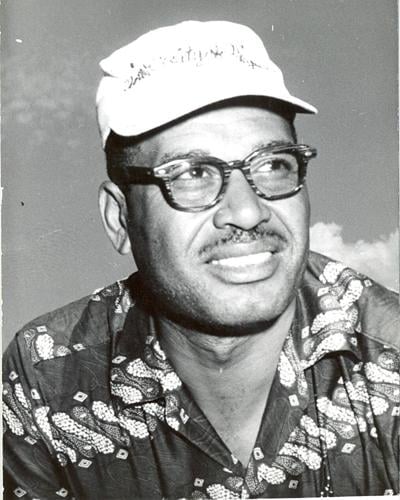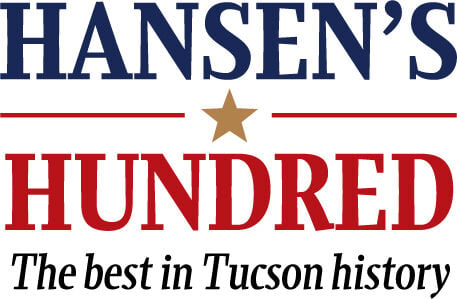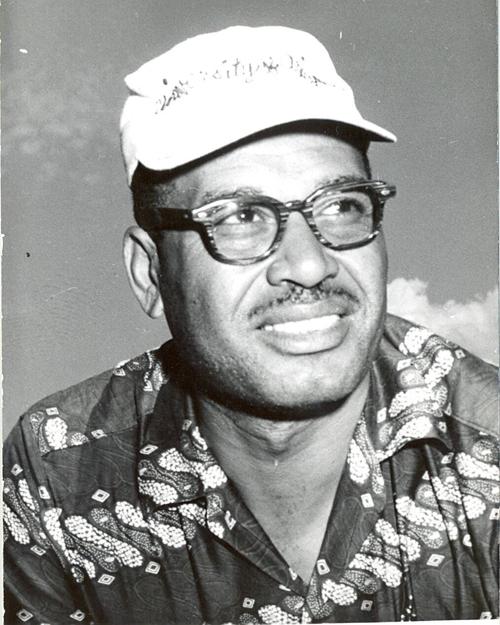On my first day as the Star’s football beat writer, UA sports information director Bob Jacobsen introduced me to head coach Larry Smith and his staff, then said “there’s someone else I want you to meet.”
We walked to the equipment room at McKale Center where Jacobsen peered through a wire cage into a vast supply of helmets, shoulder pads and cleats.
“Turk,” he said. “I want you to meet the Star’s new football writer.”
Ed Thomas shook my hand and asked where I grew up.
“Utah.”
“I won’t hold it against you,” he said with a firm handshake but no smile.
I asked Thomas where he got the nickname “Turk.”
“In the Army,” he said. “You can call me Ed.”
It was about trust. To gain the trust of Ed Thomas, who is No. 48 on our list of Tucson’s Top 100 Sports Figures of the last 100 years, he first wanted to see how you treated others.

Thomas was one of too few Black employees in the UA athletic department in the early 1980s.
A year or two later at Camp Cochise — the UA’s weeklong football training camp on the Cochise College campus — I sat with Thomas at lunch. He told me he was not allowed to attend nearby Douglas High School 45 years earlier.
“They did not accept Black students,” he said. “My dad was in a Cavalry unit assigned to Fort Huachuca, but they sent all the Black soldiers and their families to Nogales. We weren’t allowed to attend Nogales High School either, so they bused us in the back of a GI truck every day to Tombstone High School. We were the first Black students allowed at Tombstone.”
In 1938 and 1939, Thomas was one of the state’s leading football and track athletes. No one offered him a scholarship even though he earned 16 letters in four sports at Tombstone.
“I was big enough, and I was good enough,” he said, “but Arizona didn’t give me a look. I had to go into the Army.”
When he left military service in 1948, he joined his father, Emmett Thomas, who was a chef for the UA’s football team and retired master sergeant of the U.S. Cavalry.
“The only other Black employee in the athletic department then was Slim Williams, the equipment manager,” said Thomas. “He died of a heart attack, and I was hired to take his place. For quite a while, my dad and I were the only Black employees in the athletic department. It wasn’t a good time to be a Black man in Tucson, but it gave me a start.”
Over the next 35 years, Ed Thomas made the best of that start. He became a pseudo-liaison between Black athletes and the athletic administration, serving under 10 football coaches and four athletic directors. When he retired in 1985, he was elected to the UA Sports Hall of Fame.
He was on the job when Arizona athletic director Dick Clausen hired the NCAA’s first Black Division I head coach, Willie Williams, who was Arizona’s track coach from 1969 to 1982. And he was on duty when the school hired Fred Snowden to be the first Division I Black head basketball coach in 1972.
“I was part coach, part recruiter, part traveling secretary,” Thomas told the Star in 1979. “I was responsible for finding Black athletes places to sleep and eat in road games.”
In a late 1960s football game at UTEP, Thomas and the UA’s Black football players were not allowed to enter the team’s hotel nor eat at the same restaurant.
“I got us space in the back of an old hospital,” he told me. “They brought food down to us. It was a long struggle to be treated fairly.”
To get an idea of Thomas’ value to the UA athletic department, on the day of the 1981 NFL draft, UA defensive lineman Mike Robinson, a fourth-round pick of the Cleveland Browns, didn’t watch the telecast with friends at a bar or with his agent or teammates.
Robinson watched the draft in Ed Thomas’ living room.
“I consider these young men part of my family,” Thomas said. “One of my favorite days is when one of the former players stops in my office to say hello to Turk.”






